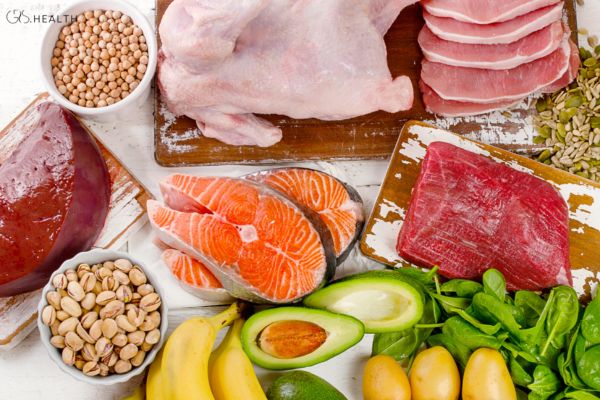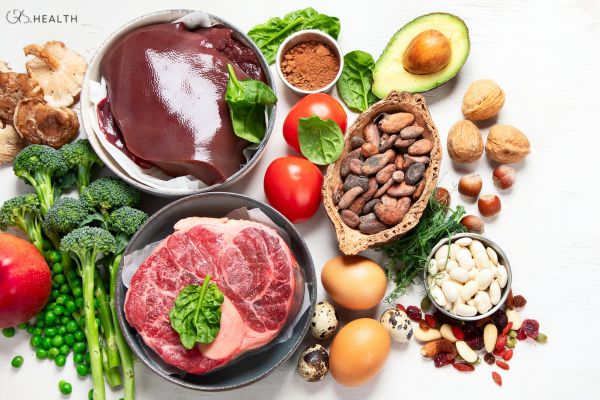Foods to ease PMS symptoms are increasingly recognized as a natural and effective way to manage monthly discomfort. Premenstrual syndrome (PMS) affects up to 75% of women of reproductive age, with symptoms ranging from cramps, bloating, mood swings, breast tenderness, headaches, to fatigue. While the exact cause of PMS isn’t fully understood, research points toward hormonal fluctuations, especially changes in estrogen and progesterone, as well as neurotransmitter imbalances such as serotonin.
Lifestyle strategies—like stress management, exercise, and sleep—play important roles in alleviating PMS. But diet is equally crucial. By focusing on nutrient-dense foods to ease PMS symptoms and avoiding certain dietary triggers, women can experience significant relief and improved well-being.
How Nutrition Influences PMS
Dietary choices influence PMS through several mechanisms:
Hormonal Regulation: Nutrients such as magnesium, vitamin B6, and calcium support optimal hormone metabolism.
Serotonin Production: Tryptophan-rich foods boost serotonin, helping stabilize mood swings.
Inflammation Reduction: Omega-3 fatty acids and antioxidants reduce prostaglandins that worsen cramps.
Fluid Retention Control: Potassium-rich foods combat bloating, while reducing sodium minimizes water retention.
Blood Sugar Balance: Whole grains and fiber-rich foods prevent energy crashes and irritability.
This makes it clear: focusing on the right foods is not just about general health—it’s a targeted strategy to reduce PMS discomfort.
Key Nutrients and Foods to Ease PMS Symptoms
1. Magnesium-Rich Foods for Relaxation
Magnesium helps relax muscles, reduce cramps, and stabilize mood. Studies suggest women with PMS often have lower magnesium levels, making dietary intake vital.
Best sources include:
Dark leafy greens (spinach, kale)
Pumpkin seeds and sunflower seeds
Almonds and cashews
Black beans and lentils
Dark chocolate (in moderation)
These magnesium-rich foods to ease PMS symptoms may also reduce migraines and improve sleep quality, both common PMS challenges.
(I recommend that you read about the benefits of dark chocolate.)
2. Vitamin B6 and Mood Regulation
Vitamin B6 (pyridoxine) supports the production of neurotransmitters such as serotonin and dopamine, which regulate mood and reduce irritability. A lack of B6 has been linked to heightened PMS symptoms like depression, fatigue, and anxiety.
Top sources:
Chickpeas
Salmon and tuna
Bananas
Fortified cereals
Poultry (chicken, turkey)
Eating B6-rich foods to ease PMS symptoms may be especially effective when combined with magnesium for synergistic effects.

3. Calcium and Vitamin D for Hormonal Balance
Calcium plays a critical role in reducing PMS symptoms such as bloating, mood swings, and fatigue. Combined with vitamin D, it improves calcium absorption and supports healthy ovarian function.
Food sources:
Low-fat dairy (yogurt, milk, cheese)
Fortified plant-based milks (soy, almond, oat)
Sardines and salmon with bones
Kale, broccoli, and bok choy
Regular consumption of calcium-rich foods to ease PMS symptoms may reduce both physical and psychological discomfort.
4. Omega-3 Fatty Acids for Inflammation and Pain Relief
Omega-3 fatty acids help lower the production of pro-inflammatory prostaglandins that trigger cramps. They also support brain health, reducing anxiety and depressive symptoms.
Sources include:
Fatty fish (salmon, mackerel, sardines)
Flaxseeds and chia seeds
Walnuts
Algal oil (vegan-friendly option)
Omega-3-rich foods to ease PMS symptoms can be especially effective for women who experience severe menstrual cramps (dysmenorrhea).
5. Complex Carbohydrates for Steady Energy
Refined sugars cause blood sugar spikes and crashes, worsening irritability and fatigue. Complex carbs, on the other hand, provide steady energy and promote serotonin release.
Best options:
Whole grains (brown rice, oats, quinoa, barley)
Sweet potatoes
Legumes (lentils, chickpeas, beans)
Fruits with fiber (apples, pears, berries)
Consuming complex carbs as part of foods to ease PMS symptoms helps reduce cravings while stabilizing mood.
6. Iron-Rich Foods to Combat Fatigue
For women who experience heavy menstrual bleeding, iron stores may be depleted, leading to fatigue and weakness. Eating iron-rich foods before and during menstruation is crucial.
Sources include:
Lean red meat
Spinach and kale
Lentils and black beans
Pumpkin seeds
Fortified cereals
Pairing iron-rich foods with vitamin C (from citrus or bell peppers) enhances absorption, making these excellent foods to ease PMS symptoms.

7. Potassium to Reduce Bloating
Potassium regulates fluid balance and helps reduce water retention and bloating, common PMS complaints.
Potassium-rich foods:
Bananas
Avocados
Sweet potatoes
Beans and lentils
Coconut water
Integrating potassium foods to ease PMS symptoms can help women feel lighter and more comfortable during their cycle.
8. Probiotic Foods for Gut and Hormonal Health
Emerging research suggests the gut microbiome influences estrogen metabolism and mood regulation. Probiotics improve digestion, reduce bloating, and support hormonal balance.
Best probiotic foods:
Yogurt with live cultures
Kefir
Sauerkraut and kimchi
Miso and tempeh
Kombucha
Regular intake of probiotic-rich foods to ease PMS symptoms may enhance overall digestive and reproductive health.
9. Herbal Teas for Natural Relief
Herbal teas offer soothing benefits and can reduce cramps, bloating, and stress.
Effective options:
Ginger tea: Anti-inflammatory and pain-relieving
Chamomile tea: Calms nerves and reduces cramps
Peppermint tea: Relieves bloating and digestive discomfort
Raspberry leaf tea: Traditionally used for uterine health
Incorporating these teas as part of foods to ease PMS symptoms can provide gentle, natural relief.
Foods to Avoid During PMS
Just as important as what you eat is what you avoid. Certain foods can worsen PMS symptoms.
High-sodium foods: Increase bloating and water retention.
Refined sugars: Worsen mood swings and fatigue.
Caffeine: May increase anxiety, breast tenderness, and sleep issues.
Alcohol: Exacerbates mood swings and disrupts liver function in hormone metabolism.
Processed foods: Often high in unhealthy fats, sodium, and sugar.
Avoiding these can make room for more nutrient-dense foods to ease PMS symptoms.
Meal Planning for PMS Relief
Here’s how you might structure meals with foods to ease PMS symptoms:
Breakfast: Oatmeal topped with chia seeds, walnuts, and banana slices
Snack: Greek yogurt with berries and sunflower seeds
Lunch: Quinoa salad with spinach, chickpeas, avocado, and olive oil
Snack: Dark chocolate (70% cacao) with pumpkin seeds
Dinner: Grilled salmon with steamed broccoli and sweet potato
Evening: Chamomile tea with a slice of whole-grain toast and almond butter
This nutrient-dense plan provides magnesium, B6, calcium, omega-3s, and potassium—all foods to ease PMS symptoms naturally.
Lifestyle Tips Alongside Nutrition
While diet is powerful, pairing it with lifestyle habits enhances results:
Exercise regularly: Reduces cramps and boosts endorphins.
Get quality sleep: Poor sleep worsens PMS symptoms.
Manage stress: Yoga, meditation, and breathing exercises help balance cortisol.
Stay hydrated: Water intake reduces bloating and headaches.
Nutrition plus lifestyle balance creates a comprehensive approach to easing PMS.
Conclusion
PMS may be a common part of the menstrual cycle, but it doesn’t have to be debilitating. A nutrient-rich diet with magnesium, B vitamins, calcium, omega-3s, probiotics, and potassium can significantly improve both physical and emotional symptoms. Avoiding processed and inflammatory foods enhances these benefits.
By consistently choosing the right foods to ease PMS symptoms, women can experience greater comfort, balance, and well-being during their cycle.
Sources
- Office on Women’s Health, PMS Fact Sheet
- National Institutes of Health, Magnesium and PMS
- NIH, Calcium and PMS










